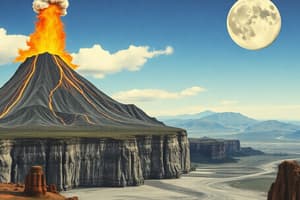Podcast
Questions and Answers
What is the main focus of volcanism?
What is the main focus of volcanism?
- Creation of vent or opening in the Earth's crust
- Expulsion of hot materials like lava (correct)
- Formation of mountains and hills
- Creating surface features
What is the outer core made of?
What is the outer core made of?
- Solid, rocky substance
- Molten iron and nickel (correct)
- Molten rock or magma
- Liquid metal creating the earth's magnetic field
Where does the word 'volcano' come from?
Where does the word 'volcano' come from?
- A volcanic eruption in ancient Rome
- An island in Italy called Vulcano (correct)
- A Latin word meaning 'fire mountain'
- The Roman god of fire - Vulcan
What was the role of the Roman god Vulcan?
What was the role of the Roman god Vulcan?
What is the mantle made of?
What is the mantle made of?
What did Romans believe would happen if Vulcan was made angry?
What did Romans believe would happen if Vulcan was made angry?
What is the main component of the Inner Core of the earth?
What is the main component of the Inner Core of the earth?
How are volcanoes formed?
How are volcanoes formed?
Where are most of the world's earthquakes and volcanoes located?
Where are most of the world's earthquakes and volcanoes located?
What is an active volcano?
What is an active volcano?
What is a dormant volcano?
What is a dormant volcano?
Why do earthquakes and volcanic eruptions occur near the edges of tectonic plates?
Why do earthquakes and volcanic eruptions occur near the edges of tectonic plates?
What is an ash vent in relation to a volcano?
What is an ash vent in relation to a volcano?
What is a cloud in relation to a volcano?
What is a cloud in relation to a volcano?
What is a crater in relation to a volcano?
What is a crater in relation to a volcano?
What does 'extinct' refer to in terms of volcanoes?
What does 'extinct' refer to in terms of volcanoes?
Which planet has the largest known volcano called Olympus Mons?
Which planet has the largest known volcano called Olympus Mons?
Which moon of Jupiter has several active volcanoes?
Which moon of Jupiter has several active volcanoes?
What do the volcanoes on Triton, Neptune's largest moon, release?
What do the volcanoes on Triton, Neptune's largest moon, release?
What is a characteristic of a volcanic eruption on Earth?
What is a characteristic of a volcanic eruption on Earth?
Flashcards are hidden until you start studying
Study Notes
Volcanism
- The main focus of volcanism is the study of volcanoes, their formation, and their eruptions.
Earth's Structure
- The outer core is made of liquid iron and nickel.
- The mantle is made of hot, viscous rock.
Etymology
- The word 'volcano' comes from the Roman god Vulcan, who was the god of fire and volcanoes.
Roman Mythology
- Vulcan was the Roman god of fire and volcanoes, and was believed to live under Mount Etna.
- Romans believed that if Vulcan was made angry, he would erupt with fire and earthquakes.
Earth's Core
- The main component of the Inner Core of the earth is solid iron and nickel.
Volcano Formation
- Volcanoes are formed when magma from the earth's interior rises to the surface, resulting in eruptions.
Distribution of Earthquakes and Volcanoes
- Most of the world's earthquakes and volcanoes are located near the edges of tectonic plates.
Volcano Types
- An active volcano is one that has erupted in recent history and is expected to erupt again.
- A dormant volcano is one that has not erupted in recent history but is expected to erupt again in the future.
Earthquakes and Volcanic Eruptions
- Earthquakes and volcanic eruptions occur near the edges of tectonic plates due to the movement and interaction of the plates.
Volcanic Features
- An ash vent is a narrow opening in a volcano through which ash and gases are emitted.
- A cloud in relation to a volcano refers to the cloud of ash and gas that forms above the volcano during an eruption.
- A crater is a depression in the earth's surface formed by volcanic activity.
Volcanic Status
- 'Extinct' refers to a volcano that is no longer active and will not erupt again.
Volcanoes in the Solar System
- Olympus Mons on Mars is the largest known volcano in the solar system.
- Io, a moon of Jupiter, has several active volcanoes.
- Volcanoes on Triton, Neptune's largest moon, release geysers of ice and rock particles.
- A characteristic of a volcanic eruption on Earth is the release of hot ash, gas, and rock into the atmosphere.
Studying That Suits You
Use AI to generate personalized quizzes and flashcards to suit your learning preferences.




